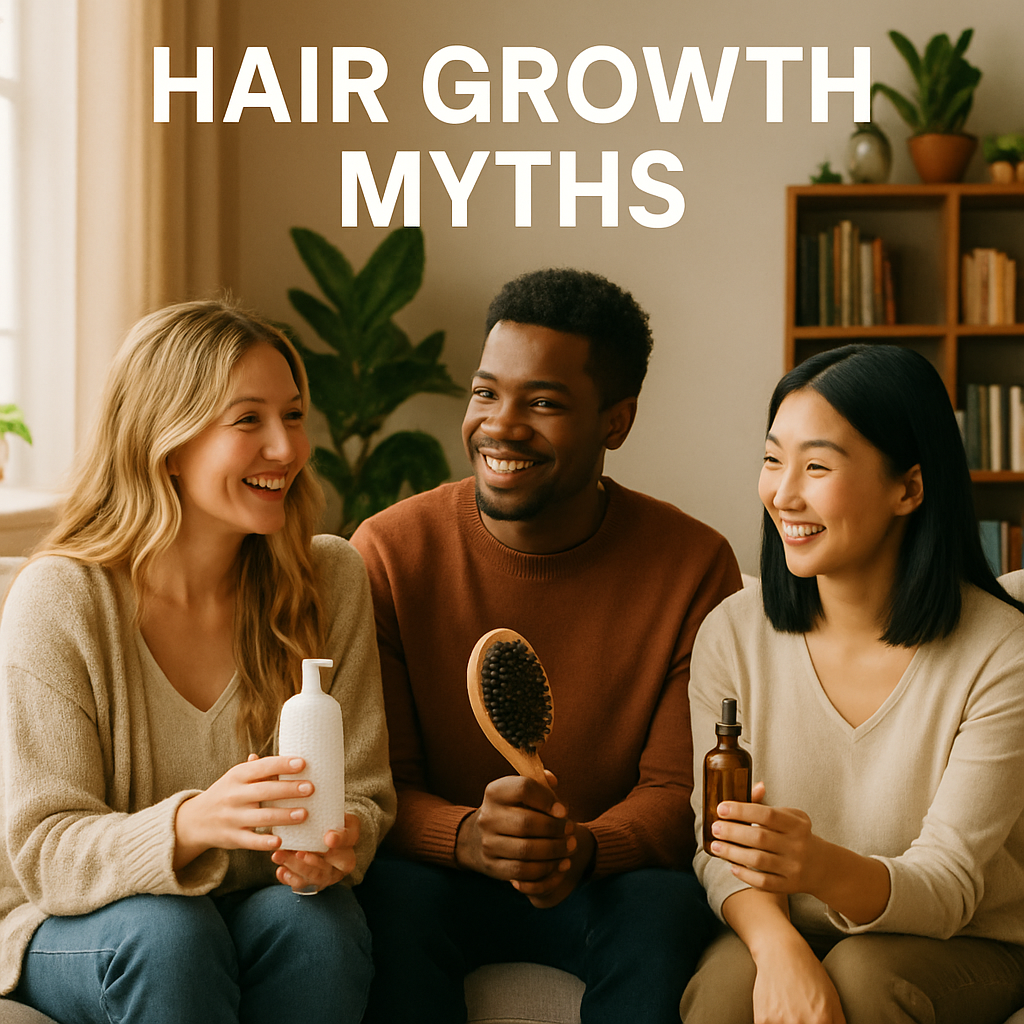The science of hair growth myths debunked

Hair has always been a topic of fascination and, let’s be honest, a bit of obsession for many. Whether it’s growing it longer, keeping it thicker, or even bringing it back when it’s gone, there’s no shortage of advice out there. But, as with anything, not all advice is created equal. Some of it sounds pretty convincing until you scratch the surface and realize that what you’re working with is more myth than science.
Common Hair Myths and the Truth Behind Them
Let’s chat about trimming. We’ve all heard the age-old wisdom: “If you want your hair to grow, get regular trims.” The logic, they say, is that cutting off the split ends will somehow send a signal to your hair to grow faster. It’s a nice thought, right? But, while trimming can indeed keep your ends looking healthy, it doesn’t actually make your hair grow faster. Hair growth starts at the scalp, and it doesn’t care what you’re doing at the other end. According to Dr. Alan Bauman, a renowned hair restoration physician, hair grows at a fairly consistent rate of about half an inch per month, regardless of how often you trim it. Keeping it neat might make it look better, but it won’t speed things up.
Now, what about the idea that shampooing every day stunts growth? My friend Lisa swore off daily washes after reading somewhere that it strips the hair of its natural oils, preventing it from growing. Sure, overwashing can dry out your scalp, but as far as growth goes, it’s not stopping anything. Dr. Francesca Fusco, a dermatologist specializing in scalp health, notes that cleanliness, in fact, is crucial. A clean scalp provides a healthy environment for growth, so wash according to your hair type, not an arbitrary calendar rule.
The Role of Diet and Supplements
Diet plays a massive role in hair health, but it’s not always the quick fix people hope it is. My cousin jumped on the biotin bandwagon after reading that it could transform her fine hair into a luscious mane. While biotin is essential for healthy hair, unless you’re deficient, popping those pills probably won’t do much. A balanced intake of proteins, vitamins, and minerals is essential, but it’s not like eating a magic bean that sprouts into a beanstalk overnight.
Protein, for instance, is the building block of hair, so getting enough of it is crucial. But overloading on steak isn’t going to speed up growth. Dr. Paradi Mirmirani, a dermatologist with the American Academy of Dermatology, suggests focusing on overall nutrition rather than individual nutrients. A deficiency can halt hair growth, but excess doesn’t accelerate it.
Stress and Hair Growth
Ah, stress the great equalizer. We’ve all had those moments of panic when clumps of hair seem to be shedding faster than usual. And yes, stress can indeed affect hair growth. The condition telogen effluvium, in which stress pushes hair follicles into a resting phase, is real. But it’s usually temporary. Once the stress is managed, hair tends to find its way back.
I once had an incredibly stressful exam period. I remember thinking, “If I keep pulling my hair out over this, I won’t have any left.” And while I did shed more than usual, a few months down the line once the exams were a distant memory my hair decided to forgive me. It’s a reminder that the body often does what it wants, regardless of how much we fret over it.
Surprising Tidbits
Let’s pivot to something that might surprise you. Ever heard that brushing your hair 100 times a day will make it grow faster? This one’s as old as time, yet still hangs around. The idea is that it stimulates the scalp and distributes oils, promoting growth. In reality, excessive brushing can lead to breakage and damage. A gentle brush here and there to distribute oils is beneficial, but don’t count strokes like you’re in some fairy tale.
And then there’s the belief that cold water rinses will lock in shine and help hair grow. Honestly, this one just leaves you shivering. Cold water can make the cuticle lay flat, giving the appearance of shinier hair, but it doesn’t influence growth. So, if you’ve been enduring icy showers for the sake of your mane, maybe it’s time to rethink that strategy.
The Science of Hair Growth
Hair growth is a fascinating process governed by the hair follicle, a minuscule but mighty structure. According to Dr. Angela Christiano, a professor of dermatology and genetics at Columbia University, the life cycle of a hair strand involves three main phases: anagen (growth), catagen (transitional), and telogen (resting). Most myths ignore these biological facts, focusing instead on external factors that supposedly influence growth.
Anagen is the active growth phase, and it can last anywhere from two to seven years depending on genetics. So if you’re wondering why your friend’s hair seems to grow faster than yours, blame it on her genes, not her routine.
Personal Trials and Tribulations
If we’re being honest, many of us have probably tried at least a couple of these myths at some point. I’ll admit to once spending a small fortune on a miracle hair tonic that promised to double my hair length in three months. Spoiler: it didn’t work. It smelled pretty awful, too, but that’s beside the point. The lesson? If it sounds too good to be true, it probably is.
Navigating through the sea of hair growth myths can be tricky. But understanding the basic science behind hair growth can help sift through fact and fiction. Remember, healthy hair starts from within literally at the follicle level and no amount of external treatments can change the biology of your hair.
Our obsession with hair is not likely to fade anytime soon, and neither will the myths that surround it. But the more we know about what really affects hair growth, the better we can care for our locks. In the end, taking care of your hair is about feeling good about yourself, and that’s always worth the effort.


